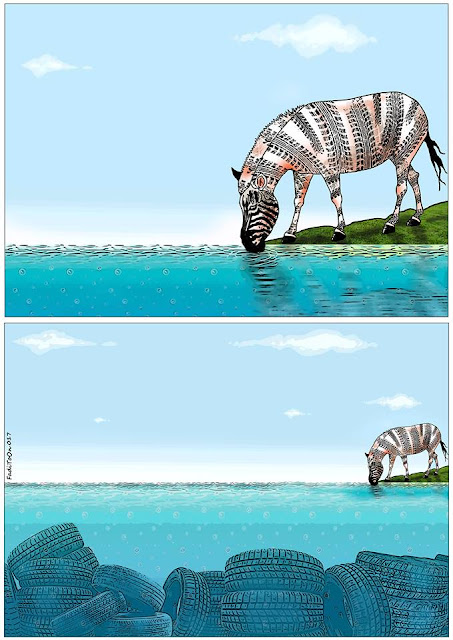On the first anniversary and the 100th
 |
| William Roberts: The First German Gas Attack at Ypres, detail. |
August 21 marks the first anniversary of Assad using poison gas aganst his own population.
Gas as a weapon in war was used for the first time in August 1914, the first month too of World War I. It was tear gas employed by the French. Which was mainly an irritant gas, but sadly the next step was taken in April 1915 with the first poison gas. This time chlorine, the very same one Assad would apply in the next century.
Europeans are a sordid lot, who have invariably tested weapons of the worst kinds on each other. Poison gas has by no means been the most lethal of weaponry in terms of the number of its casualites on the battlefield. But being a silent killer, its mental impact has been all the greater. Those, who had been exposed to it, might be taken ill as late as 30 years after the fact, choking and frothing as if drowning from within. We took a look at The Black Duck and his poison gas at this blog last year, in which I included the masterpiece by William Roberts. In 1918 he portrayed the panic and pain of exposure, a motif of no centre, giving the beholder a feeling of being about to be run over. The canvas is of a magnitude to occupy the entire vision of the beholder, and the colors of nausea cooperate to create a sickening sight.
The three poignant words the old Lie by Wilfred Owen belongs to his poem on witnessing a fellow soldier succumb from the gas. Words from 1917/18 to be recognized by the very young of Syria today. Below is the latter part of his poem. Wilfred Owen himself did not live to see the end of the war:
Gas! GAS! Quick, boys! – An ecstasy of fumbling,
Fitting the clumsy helmets just in time;
But someone still was yelling out and stumbling,
And flound'ring like a man in fire or lime . . .
Dim, through the misty panes and thick green light,
As under a green sea, I saw him drowning.
Fitting the clumsy helmets just in time;
But someone still was yelling out and stumbling,
And flound'ring like a man in fire or lime . . .
Dim, through the misty panes and thick green light,
As under a green sea, I saw him drowning.
 |
| William Roberts: The First German Gas Attack at Ypres, detail. |
In all my dreams, before my helpless sight,
He plunges at me, guttering, choking, drowning.
 |
| William Roberts: The First German Gas Attack at Ypres, detail. |
If in some smothering dreams you too could pace
Behind the wagon that we flung him in,
And watch the white eyes writhing in his face,
His hanging face, like a devil's sick of sin;
If you could hear, at every jolt, the blood
Come gargling from the froth-corrupted lungs,
Obscene as cancer, bitter as the cud
Of vile, incurable sores on innocent tongues,
My friend, you would not tell with such high zest
To children ardent for some desperate glory,
The old Lie: Dulce et Decorum est
Pro patria mori.
 |
| William Roberts: The First German Gas Attack at Ypres, detail. |
The statement of the Solidarity with the Syrian Revolution can be read in its entirety here. They have created a day of remembrance all over the world, and the final section of their statement reads thus on the situation and importance of the Syrian revolution:
The Syrian revolution is at a crossroads, and Syrian revolutionaries are in desperate need of support as they fight on several fronts. A victory for the various counter-revolutions would make permanent the largest ethnic cleansing of our century, leave the country in ruins, and critically destabilise the region and the world. A victory for the revolution, however, would unleash long-repressed social and political aspirations throughout the Arab world and beyond.


